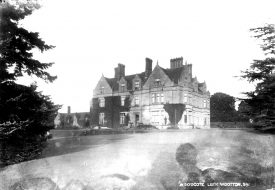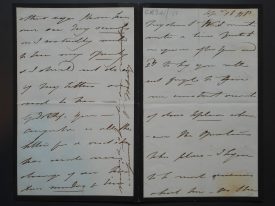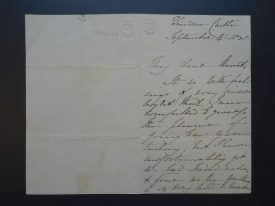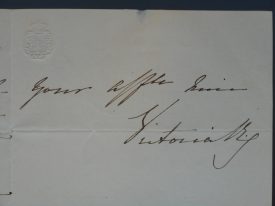Warwickshire County Record Office holds many fine collections relating to Warwickshire’s landed families; they are treasure troves which never fail to fascinate and surprise the reader. The Waller Family of Woodcote collection, in particular, holds many historical gems which really capture one’s attention.
Waller (née Jonathan Wathen Phipps), who was born into a wealthy family, had a highly successful career in medicine. He specialised in the treatment of eye diseases which led him to become a renowned operator on cataracts. Notably, he was also appointed as Oculist to King George III. Waller went on to serve George IV and William IV, and become a close friend to several members of the royal family.
The correspondence1, therefore, provides a glimpse into the lives of the royal family and those who served them. Indeed, it not only offers insight into medical practice at the time, but also high society news, and some of the royals’ extravagant purchases.
Sir Jonathan Wathen Waller and Princess Mary
The first document (CR341/152) is a letter written by Princess Mary, Duchess of Gloucester (1776-1857) to Waller. While we know that it was written on the 16th September, we cannot be sure of the exact year of the letter. However, the black edges show that the Princess was still in mourning for the death of George IV, who died on the 26th June 1830. Waller was in attendance and was the only person to hear the King’s last words. The doctor’s detailed account of the event has also been preserved within the collection.
In the Princess’s letter she does not discuss her brother but rather the health of her sister, Princess Sophia (1777-1848). The latter was plagued with frequent bouts of ill health and became blind in her later years. As such, Sophia’s poor eyesight becomes the key focus of this letter. Mary requests that Waller keep her informed about Sophia and her upcoming operation. She mentions Sophia’s own admission that her sight was becoming “much darker” and hopes for success as a reward after her submission to trials. Princess Mary wants Sophia to keep writing, and she asks Waller if Sophia can still read the letters that she sends to her. Crucially, Mary states that she would like to know if someone else is reading the letters, because she writes very openly.
We can also see many examples of Princess Sophia’s writing in the collection because she wrote extensively to Waller on a range of topics. It is bittersweet, however, as her handwriting becomes very difficult to decipher.
Queen Victoria and Princess Mary
The second document (CR341/48) is a letter written by Queen Victoria (1819-1901) to her Aunt, Princess Mary. Interestingly this letter, along with another, can be found in Waller’s collection of received correspondence. Their placement and ownership raise several key questions. How and why did Waller come to possess these documents? Was it accidental? Or did they have a more significant purpose?
While we cannot be completely sure of the answers to these questions, we can speculate nonetheless. In the letter on display, the Queen offers her sincere regret at not being able to visit her Aunt due to ill health. Perhaps Waller was sent the letter so that he could be informed of her medical situation. The letter is dated 4th September 1838, only two months after the Coronation, so it would have been vital to keep the new Queen well. Alternatively, it may have been used in a social manner. Perhaps Waller also was intending to visit the Princesses, Mary and Sophia, and the letter was sent in order to let the doctor know not to attend.
Do you have any different theories? Do get in touch!
The two letters, and many others in the collection, enable us to catch a glimpse of Waller’s close relationships with the royal family. The most delightful thing about them, I find, is warmth and affection that leaps from the pages. It is evident particularly when Queen Victoria asks Princess Mary to give her “kindest love to Aunt Sophia,” who she was “particularly sorry not to see.” Comments like this, along with other letters too, enable us to see another side to 19th century British royalty.
1 Warwickshire County Record Office, references CR341/152 and CR341/48
This article was Document of the Month for the Warwickshire County Record Office in August 2017. Further articles can be found on their website.











Comments
Add a comment about this page